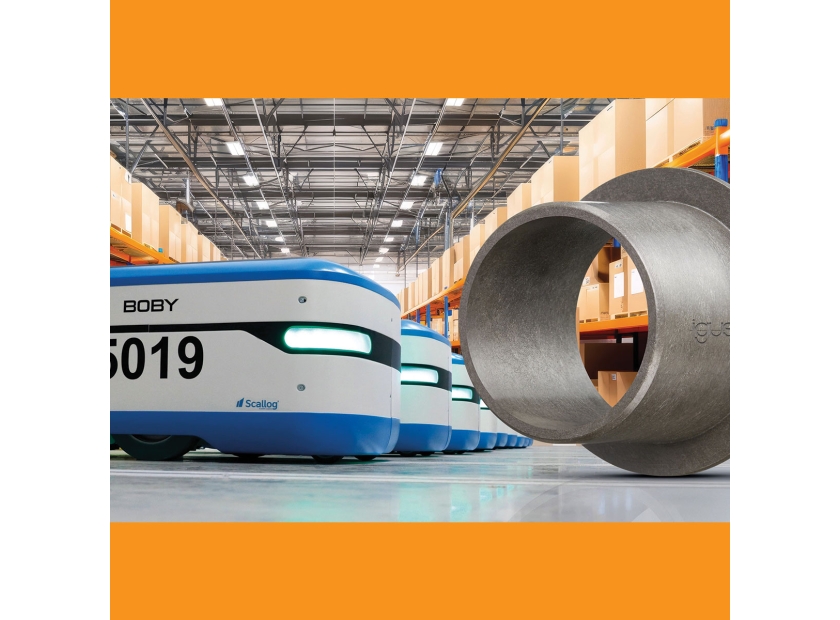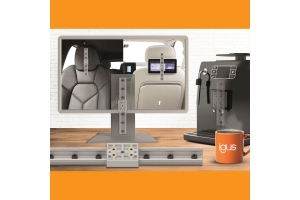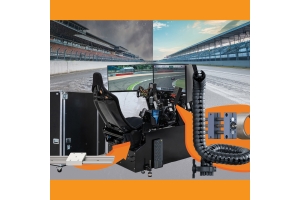This robot piggybacks 600kg shelves
This robot piggybacks 600kg shelves
SCALLOG builds autonomous logistics robot "Boby" with robust and lubrication-free plastic plain bearings from igus
The French company SCALLOG has developed an autonomous robot called "Boby" that can transport shelves weighing up to 600kg in logistics warehouses. To maximise the robot's range and minimise maintenance, the engineers rely on lubrication-free iglidur plain bearings from plastics specialist igus, which are wear-resistant and significantly lighter than comparable metal solutions.
The work of order pickers in e-commerce warehouses is physically demanding. Every day, they travel up to 15km to pick up the products needed for orders from the shelves. The French company SCALLOG has developed "Boby" to relieve employees and increase their performance. The autonomous logistics robot can independently transport shelves to the picking station and thus manage up to 600 picks per hour. Several robots can also work in a swarm, allowing the automation capacity to be scaled flexibly. According to SCALLOG, this leads to a 40% increase in productivity. The solution is now used not only in e-commerce but also in industry, e.g. at Decathlon, Farmy, Bricolux and the Blondel Group.
Polymer plain bearings withstand high loads
The engineers faced a particular challenge when developing "Boby". They had to find plain bearings for the scissor joints of the integrated lifting table that were robust enough to bear the weight of the shelves, which can amount to 600kg. At the same time, the bearings had to be low-maintenance, cost-effective and compact enough for the robot's limited installation space. For this reason, the engineers decided in favour of iglidur G slide bearings from igus. Thanks to the use of tribologically optimised high-performance polymers that are optimised for friction and wear, they are particularly resistant and durable even when subjected to high edge loads and impacts. This means that they still operate reliably even with a load capacity of 600kg. To ensure this, the plain bearings are put through their paces in advance in the igus test laboratory. The results of the wear tests are documented and fed into an online tool that allows users to easily calculate the service life of their product.
The self-lubricating effect reduces operating costs and improves the environmental footprint
Another advantage is that the polymer bearings do not require any additional lubricants. Solid lubricants incorporated into the material ensure low-friction dry operation. As a result, the bearings are maintenance-free and represent a cost-effective alternative to metal plain bearings. Users save costs for maintenance, labour and lubricants, particularly in the case of large robotic swarms. At the same time, the polymer plain bearings also have a demonstrably positive impact on the environment. The elimination of lubricants reduces the environmental impact and energy consumption during production, use and disposal at the end of the service life. Therefore, Lubrication-free plastic bearings have a lower CO2 footprint and contribute to more sustainable production.
Order picking like at a drive-in counter
As they require neither lubrication nor maintenance, iglidur plain bearings reliably fulfil their task in the SCALLOG logistics robot. And this is how "Boby" works: as soon as the picker starts an order on the computer, the 1m-long autonomous robots, which look like lawn-mowing robots, travel to the appropriate storage locations. With a height of just 450mm and a width of 650mm, the autonomous vehicles are compact enough to drive under the shelves. Once there, they lift them using an integrated scissor system and then travel to the picking station at a speed of up to 1.5km/h. The robots are equipped with an optical sensor and orientate themselves along a marking that is glued to the floor. When they arrive at the picking station, they pass the employee one after the other like in a drive-in, so that the employee can conveniently take the products from the shelves. The robots can work autonomously for up to 14 hours without interruption and without recharging.






